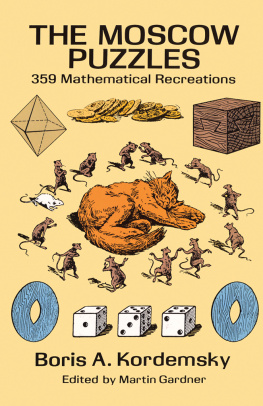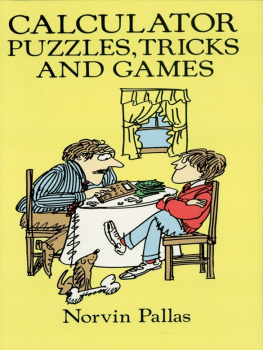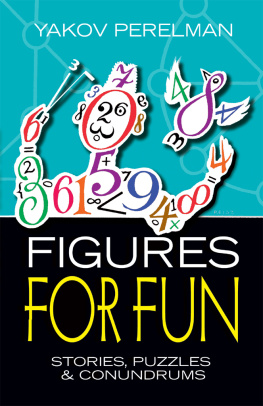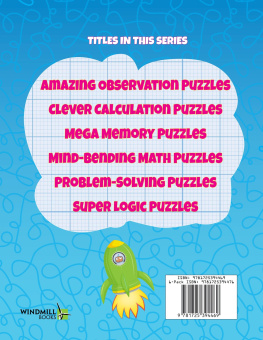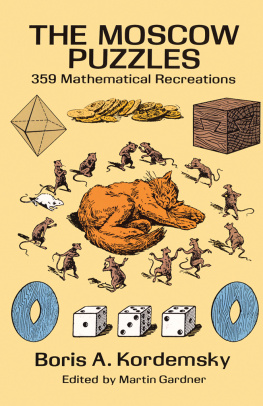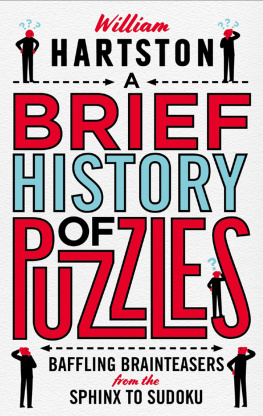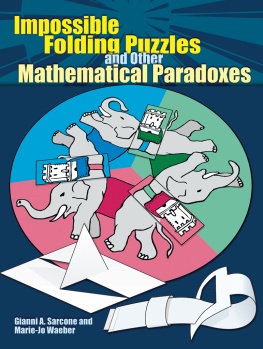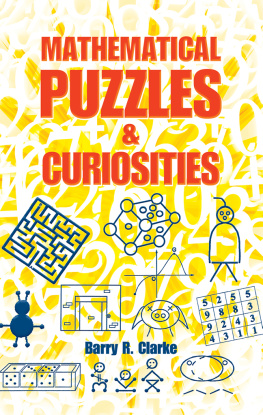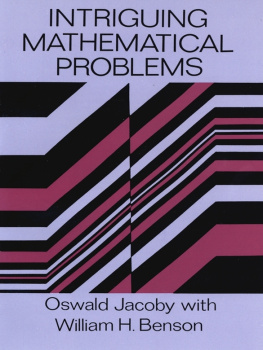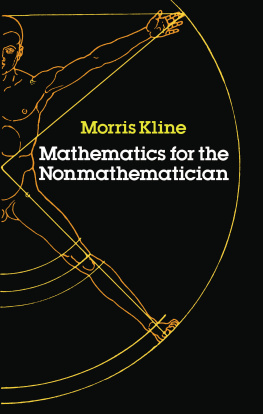The Moscow Puzzles
359 Mathematical Recreations
BORIS A. KORDEMSKY
Edited and with an introduction by
MARTIN GARDNER
Translated by Albert Parry,
Professor Emeritus of Russian Civilization and Language,
Colgate University
DOVER PUBLICATIONS, INC.
NEW YORK
Copyright 1971, 1972 by Charles Scribners Sons.
All rights reserved.
This Dover edition, first published in 1992, is a slightly altered, slightly corrected republication of the work first published by Charles Scribners Sons, New York, in 1972.
Library of Congress Cataloging-in-Publication Data
Kordemski, B. A. (Boris Anastasevich), 1907-1999
[Matematicheskaia smekalka. English]
The Moscow puzzles : 359 mathematical recreations / Boris A. Kordem-sky.
p. cm.
Translation of: Matematicheskaia smekalka.
Originally published: New York : C. Scribners Sons, 1972.
Includes index.
eISBN-13: 978-0-486-80130-8
1. Mathematical recreations. I. Title.
[QA95.K5613 1992]
793.74dc20
91-39094
CIP
Manufactured in the United States by Courier Corporation
27078519 2014
www.doverpublications.com
Contents
Introduction
The book now in the readers hands is the first English translation of Mathematical Know-how, the best and most popular puzzle book ever published in the Soviet Union. Since its first appearance in 1956 there have been eight editions, as well as translations from the original Russian into Ukrainian, Estonian, Lettish, and Lithuanian. Almost a million copies of the Russian version alone have been sold. Outside the U.S.S.R. the book has been published in Bulgaria, Rumania, Hungary, Czechoslovakia, Poland, Germany, France, China, Japan, and Korea.
The author, Boris A. Kordemsky, who was born in 1907, is a talented high school mathematics teacher in Moscow. His first book on recreational mathematics, The Wonderful Square, a delightful discussion of curious properties of the ordinary geometric square, was published in Russian in 1952. In 1958 his Essays on Challenging Mathematical Problems appeared. In collaboration with an engineer he produced a picture book for children, Geometry Aids Arithmetic (1960), which by lavish use of color overlays, shows how simple diagrams and graphs can be used in solving arithmetic problems. His Foundations of the Theory of Probabilities appeared in 1964, and in 1967 he collaborated on a textbook about vector algebra and analytic geometry. But it is for his mammoth puzzle collection that Kordemsky is best known in the Soviet Union, and rightly so, for it is a marvelously varied assortment of brain teasers.
Admittedly many of the books puzzles will be familiar in one form or another to puzzle buffs who know the Western literature, especially the books of Englands Henry Ernest Dudeney and Americas Sam Loyd. However, Kordemsky has given the old puzzles new angles and has presented them in such amusing and charming story forms that it is a pleasure to come upon them again, and the story backgrounds incidentally convey a valuable impression of contemporary Russian life and customs. Moreover, mixed with the known puzzles are many that will be new to Western readers, some of them no doubt invented by Kordemsky himself.
The only other Russian writer on recreational mathematics and science who can be compared with Kordemsky is Yakov I. Perelman (1882-1942), who in addition to books on recreational arithmetic, algebra, and geometry, wrote similar books on mechanics, physics, and astronomy. Paperback editions of Perelmans works are still widely sold throughout the U.S.S.R., but Kordemskys book is now regarded as the outstanding puzzle collection in the history of Russian mathematics.
The translation of Kordemskys book was made by Dr. Albert Parry, former chairman of Russian Studies at Colgate University, and more recently at Case Western Reserve University. Dr. Parry is a distinguished American scholar of Russian origin whose many books range from the early Garrets and Pretenders (a colorful history of American bohemianism) and a biography entitled Whistlers Father (the father of the painter was a pioneer railroad builder in prerevolutionary Russia) to The New Class Divided, a comprehensive, authoritative account of the growing conflict in the Soviet Union between its scientific-technical elite and its ruling bureaucracy.
As editor of this translation I have taken certain necessary liberties with the text. Problems involving Russian currency, for example, have been changed to problems about dollars and cents wherever this could be done without damaging the puzzle. Measurements in the metric system have been altered to miles, yards, feet, pounds, and other units more familiar to readers in a nation where, unfortunately, the metric system is still used only by scientists. Throughout, wherever Kordemskys original text could be clarified and sometimes simplified, I have not hesitated to rephrase, cut, or add new sentences. Occasionally a passage or footnote referring to a Russian book or article not available in English has been omitted. Toward the end of his volume Kordemsky included some problems in number theory that have been omitted because they seemed so difficult and technical, at least for American readers, as to be out of keeping with the rest of the collection. In a few instances where puzzles were inexplicable without a knowledge of Russian words, I substituted puzzles of a similar nature using English words.
The original illustrations by Yevgeni Konstantinovich Argutinsky have been retained, retouched where necessary and with Russian letters in the diagrams replaced by English letters.
In brief, the book has been edited to make it as easy as possible for an English-reading public to understand and enjoy. More than 90 percent of the original material has been retained, and every effort has been made to convey faithfully its warmth and humor. I hope that the result will provide many weeks or even months of entertainment for all who enjoy such problems.
Martin Gardner
The Moscow Puzzles
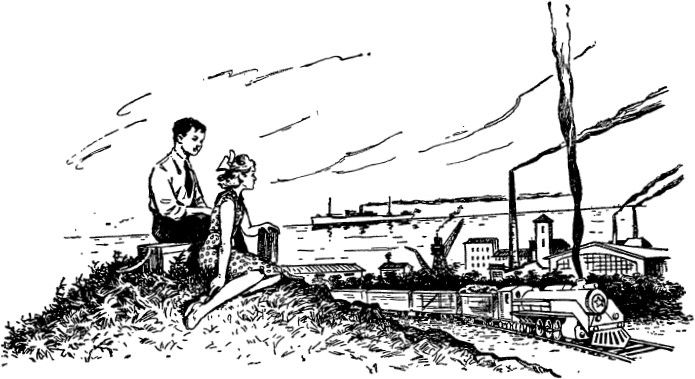
I
Amusing Problems
Using Elementary Operations
To see how good your brain is, lets first put it to work on problems that require only perseverance, patience, sharpness of mind, and the ability to add, subtract, multiply, and divide whole numbers.
OBSERVANT CHILDREN
A schoolboy and a schoolgirl have just completed some meteorological measurements. They are resting on a knoll. A freight train is passing, its locomotive fiercely fuming and huffing as it pulls the train up a slight incline. Along the railroad bed the wind is wafting evenly, without gusts.
What wind speed did our measurements show? the boy asked.
Twenty miles per hour.
That is enough to tell me the trains speed.
Well now. The girl was dubious.
All you have to do is watch the movement of the train a bit more closely.
The girl thought awhile and also figured it out.
What they saw was precisely what the artist has drawn. What was the trains speed?
THE STONE FLOWER
Do you remember the smart craftsman Danila from P. Bazhovs fairy tale, The Stone Flower?
They tell in the Urals that Danila, while still an apprentice, took semiprecious Ural stones and chiseled two flowers whose leaves, stems, and petals could be separated. From the parts of these flowers it was possible to make a circular disk.

